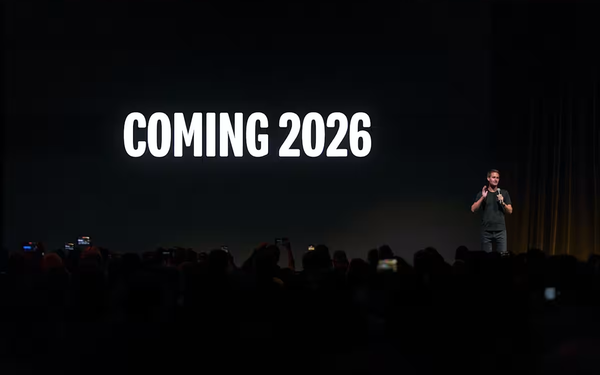
Snap plans to launch and ship a newly developed
pair of AR smart glasses to the public in 2026, ahead of Meta's Orion AR glasses, giving Snap a potential leg up on its competition, depending on the quality, pricing and consumer interest of
“Specs.”
Ten years after releasing its original smart glasses product -- “Spectacles” -- Snap CEO Evan Spiegel said on Tuesday that Specs will resemble its most recent
pair of clunky developer smart glasses, the “Spectacles 5,” but will be smaller and lighter.
With developers having spent the past year helping refine
the device, the company says Specs use advanced machine learning to “bring AI assistance into three-dimensional space, enable shared games and experiences with friends,” and offer a
“workstation for browsing, streaming, and more.”
advertisement
advertisement
Snap says it has spent over $3 billion over the past 11 years to develop Specs, which it labels a “wearable
computer” with see-through lenses that display graphics to users as if they were integrated into the world around them. Specs will also utilize an AI chatbot with the ability to process both
audio and video.
One Specs use-case Spiegel highlighted during his announcement during the Augmented World Expo in Long Beach, California is deemed “Super Travel,” and similar to
Meta's Ray-Ban smart glasses’ real-time language translation functionality, involves translating signs and menus for users in foreign countries.
The company says other developer-built
use-cases include drum lessons, which overlay visual cues on a full-sized drum set; a billiards experience; a real-time cooking helper that finds recipes based on the ingredients presented to it; and
“Wisp World,” which brings Specs users on “whimsical adventures” when exploring the world around them.
Several years after releasing smart glasses to consumers, Snap is
now entering a highly competitive market, with anticipated AR wearables being developed by tech giants like Apple, Google, and Meta, which is seeing success with its Ray-Ban collaboration and recently
landed a deal to develop XR wearables for soldiers in the U.S. Army.
In addition, Meta has pre-Orion smart glasses named “Hypernova” slated to launch later this year, while Google has signed partnerships with Warby Parker, Samsung and other major brands
to develop its XR Android wearables.
If Snap can amass interest among its developer community -- especially those who contribute to Snapchat's in-app AR experiences, which engage over 8
billion users per day -- the company could discover a unique edge over other products.
However, Spiegel has not provided a specific cost for Specs, and did not disclose details about their
design.